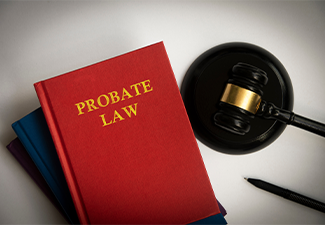Which Assets Must Go Through Probate?
July 26, 2024
 Dealing with probate already takes an emotional toll on friends and family, and it can become overwhelming very quickly throughout the legal process.
Dealing with probate already takes an emotional toll on friends and family, and it can become overwhelming very quickly throughout the legal process.
In general, the probate process ensures that a deceased person's assets are distributed according to their will or state law if there is no will. However, not all assets are subject to probate.
Our attorney at Lewis & Van Sickle, LLC will discuss the types of assets that typically must go through probate and those that may bypass this process. We are here every step of the way, providing compassionate and knowledgeable legal assistance.
Assets That Typically Go Through Probate
Several types of assets usually must go through probate for a court to facilitate their distribution:
Solely owned property: This includes real estate, cars, and other personal property titled solely in the deceased person's name.
Bank accounts: Accounts that are solely owned by the deceased with no payable-on-death (POD) or transfer-on-death (TOD) designations.
Investment accounts: Similar to bank accounts, investment accounts without any beneficiary designations will go through probate.
Personal items: All other personal items such as jewelry, art, furniture, and collectibles that were solely owned by the deceased.
Business interests: Ownership interests in sole proprietorships, partnerships, or limited liability companies (LLCs) unless otherwise specified in a business succession plan or preexisting agreement.
Assets That Usually Avoid Probate
Conversely, some assets are structured to bypass probate, making the transfer process smoother and quicker for the beneficiaries:
Jointly owned property: Real estate and other properties co-owned with rights of survivorship; ownership automatically passes to the surviving co-owner.
Retirement accounts: 401(k)s, IRAs, and other retirement accounts with designated beneficiaries.
Life insurance policies: Policies that specify beneficiaries avoid probate, and the proceeds are paid directly to the named individuals.
Transfer-on-death (TOD) and Payable-on-death (POD) designations: Accounts such as bank accounts and brokerage accounts with TOD or POD designations go directly to the named beneficiary.
Living trusts: Assets placed in a revocable or irrevocable living trust avoid probate, as they are technically owned by the trust, not the deceased individual.
Special Considerations
While the above guidelines provide a general framework, there are special considerations to keep in mind:
State variations: Probate laws can vary significantly by state, so it's crucial to consult with a local attorney to understand specific requirements.
Multiple jurisdictions: If the deceased owned property in multiple states, separate probate proceedings might be needed.
Small estates: Some states offer a simplified probate process for small estates that fall below a certain value threshold, which can simplify or expedite proceedings.
Frequently Asked Questions (FAQ) on Probate
What is Probate?
Probate is a legal process that takes place after someone dies. It involves validating the deceased person’s will, if one exists, identifying and inventorying their assets, paying off any debts and taxes, and distributing the remaining assets to the rightful beneficiaries.
How Long Does Probate Take?
The duration of probate can vary widely depending on the complexity of the estate, the local laws, and whether any disputes arise. On average, it can take anywhere from six months to over a year to complete the probate process.
Do All Estates Go Through Probate?
No, not all estates go through probate. Small estates, those with assets that have beneficiary designations, or those that are part of a living trust often bypass the probate process entirely.
Can Probate Be Avoided?
Yes, there are several ways to avoid probate, including setting up living trusts, naming beneficiaries on accounts and policies, and owning property jointly with rights of survivorship. Proper estate planning can provide a smoother transfer of assets without the need for probate.
What Are Probate Fees?
Probate fees can include court filing fees, executor fees, attorney fees, and other miscellaneous costs such as appraisal fees. These fees can vary significantly depending on the size and complexity of the estate and the state in which probate takes place.
What Happens If Someone Dies Without a Will?
If someone dies without a will, their estate is considered "intestate," and state laws will determine how their assets are distributed. Typically, assets are distributed to the closest relatives, such as spouses, children, or parents, according to the state's intestacy laws.
Who Is Responsible for Managing the Probate Process?
The executor named in the will is responsible for managing the probate process. If no executor is named or there is no will, the court will appoint an administrator to handle the estate.
Can Probate Be Challenged?
Yes, probate can be challenged. Common reasons include claims that the will is invalid due to fraud, undue influence, or that the deceased lacked the mental capacity to create the will. Beneficiaries or other interested parties may contest the will or any decisions made during the probate process.
Why Might Probate Be Required Even if There Is a Will?
Probate may still be required even if there is a will to determine that the will is valid, that all debts and taxes are paid, and that the remaining assets are correctly distributed to the beneficiaries according to the will’s instructions.
By understanding these frequently asked questions, individuals can better navigate the complexities of the probate process and make informed decisions regarding estate planning and administration.
Don't Face Probate Alone
The probate process can be complicated, and knowing which assets are subject to probate is vital for effective estate planning and administration. At Lewis & Van Sickle, LLC, we are here to guide you through each step, aiming for your loved one's assets to be distributed smoothly and according to their wishes.
If you need assistance with probate or any aspect of estate planning, don't hesitate to contact us.
